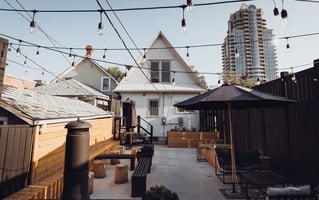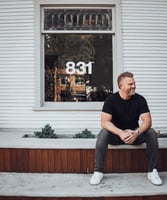We're proud to introduce House 831, a collaborative effort by Tate Hackert, Scott Bakken, and...
Trusting Your Gut: Dawson Norrish, CEO and Founder of Cubbi
Who is Dawson?
I found what I loved to do pretty early. I was a hockey guy, grew up on a farm. I was always entrepreneurial; I started a welding business when I was young. I was always free as a kid, growing up on a farm I could do whatever I wanted, when I wanted. My hometown was tiny, from kindergarten to grade 10 was like 150 kids total. I did like the small town growing up, everyone knew each other. But when it comes time to make an impact, you may have to do different things.
Before university, I took a year off so when I started, I was ready for school. I studied business and fell in love with it; grades and tests didn’t matter to me, I just fell in love with the material. I just liked to let my mind go free on projects. I did, and I still do, think about it as a puzzle, putting the pieces together but the game is always changing and new pieces are being added.

You’re interning in Calgary in the summers in Oil and Gas, how do switch routes and end up here?
The internship was great, every summer you would work in a different part of the company. I got to see different parts of the company and how it all fits together. During my last year of school, I came up with the idea of Cubbi, it was originally mini fridges for students for like 10 bucks a month. I had the idea, but then I took an entrepreneurship class and I put it all together. I really fell in love with the idea of starting a business. I spent so many hours on this project, making excuses to only work on this one class and putting off others.
We launched it during my last year of university, 2020, the worst time ever for a launch. After a year and a half of modeling and it barely worked, we outsourced the app for like 10 grand, and it just didn’t work. It was good enough for a demo though. We were able to use it to raise money, a small angel round, and then went to market with a new app.
it’s always about the next thing. We can take this and build on it, we have these data points which means the market is there. Even now, we have 10 full-time developers, and the product we have now probably won’t be the product in 5 years.
My mom was a photographer, owned a small business. She has a drive to her, she’s always dialed in but having fun with it. She’s always 'shoot from the hip and just get goin'. It was never a barrier with her to start this, she put money into it. They gave me the money to test it, and after testing it they realized I had something . I think there’s also something about seeing your child love something that puts money aside.
I think about this search for meaning a lot. I think about my mom again, she’s always optimistic and always doing something, and it got me curious about the idea of ‘what am I doing this all for?’. You want to have a mission for something. Mine was building and I wanted to be good at it. I wanted to be in control of the outcome.
The thing I love about start-ups is the idea of it always being better, tomorrow will be better. You’re always going for it. I felt like I was in control of my destiny. When you really love to do something, I just can’t imagine not being able to do it.

It has me thinking about the balance of work and life. When I thought of myself as an ‘artist’ it becomes a part of my identity. How do you approach this ‘Entrepreneur’ identity with Dawson the human?
There are explicit things in the words we can use to describe it, but there are also all the things that happen underneath. Like my dad being a farmer, that impacts the way he dresses, and the way he talks, I think it has a big impact. And the process of finding what that is. I was never big on the idea of ‘entrepreneur’ because it was branded to me in a way that didn’t fit. But whatever the word is that goes with the highs and the lows, that’s how I feel about myself.
Whatever you think of yourself as, it guides your actions and how you feel about yourself. Changing your identity can change how you make decisions.
It’s this feedback loop of giving into this persona almost, and it's giving back to you.
It’s efficient. It’s having the muscle memory of making decisions without all the information. When you’re running a business, you have to make decisions like that and be comfortable with it. Being okay when the outcome is not what you want. I can imagine for you or other artists, you don’t necessarily feel shy about expressing yourself, that’s who you are or what you do.
How do you develop that trust in yourself instinctually?
Innately, it’s kind of always been like that. But it was the realization that if I wanted to do something, I was gonna do it. You learn more about yourself as you grow.
You’ve also done a really great job of picking who you want at your side to make decisions for the business.
That’s something we’re proud of. We’re quick at making decisions for what team we want to build. We look for people who just care a lot. I realized if you find someone who is just dialed in. People can figure out the on-the-job stuff pretty quickly, but it's someone who has something special about them that can’t be taught. Self-motivation, someone who wants to do great work, take pride in their work. It’s also teamwork and the way the relationship is formed, on trust. I had an investor say to me one time ‘If I only see ten things that you do, and two of them are bad, I think that 20% of them are bad’.

How do you handle the failures or the misses?
First, it’s like ‘damn it’, but then it’s ‘okay next, let’s try again.’. You look at it like what can we do better for next time. And next time our processes are better. If you go through your process, and your process was supposed to have an 80% success rate, and it doesn’t work out, it doesn’t mean your process was wrong but that the 20% chance happened. It’s maybe being wrong but being wrong for the right reasons. It’s more on systems and making sure we have a high likelihood of success.
What do you think was the one thing that someone did for Cubbi that really helped you?
I think it was the investors who bet on enthusiasm over experience. Everyone knew the models were wrong, the forecasts were wrong. I cold-emailed this one guy, and he actually responded and we set up a meeting. I kept him updated with our investor updates and over time we built this relationship and he became such a mentor because he was able to be honest with us. There was a mutual trust that went beyond the small wrongs. The confidence that built in me changed everything. It’s having someone that was able to push us to find our way, while not beating us up over the little things.
What are you proud of?
I think there are outcomes that should not have worked, but did. Like our original idea, it’s just a fridge, who cares about a fridge? But we realized the fridge becomes the biggest connection to food. It’s also a great delivery system, you can drop off food without having to meet people right away. It’s playing with the idea until it works.
Someone said to me ‘You’re in a startup, it’s by definition not supposed to work’. If anyone on your team says they’re not sure it’s gonna work out, they have to go. It’s not supposed to work, but it’s your job to make it work.
What have you been reading lately?
I try to read a ton of different books. I read this book called “Guns, Germs, and Steel” and it was about the whole history of human evolution. Recently, I read “Prisoners of Geography” which talks about the history of geography and how it forms geopolitics. I try to round myself out with what I read, whatever I happen to be interested in.
A huge thank you to Cubbi for keeping us fed, and to Dawson for inviting me in and being so open.
Writer and Photographer | Sam Doty


